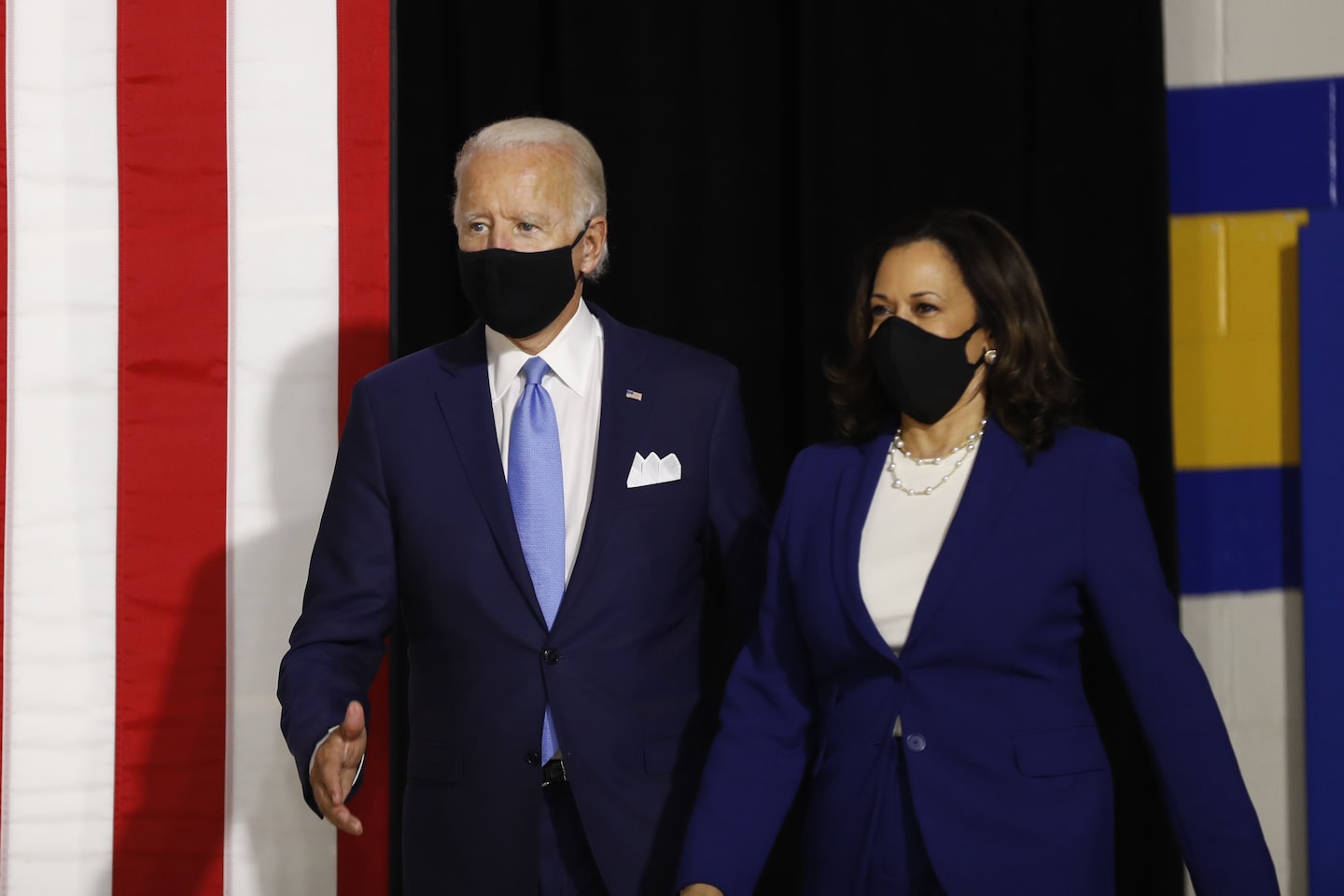Biden and Harris proved it doesn’t take a rally to deliver a big message

A man and a woman spoke to the people without high drama or elaborate stagecraft. Yes, there was a row of state flags and American flags that served as a backdrop. And in preparation for this moment, it seemed as though a dozen stagehands each tugged on those flags a dozen times to make sure they were hanging just so. Still, that was quite a modest set, quite a nothing set, compared with the usual rolling out of a presidential running mate.
If public health had allowed, surely former vice president Joe Biden, the presumptive Democratic presidential nominee, would have indulged in a rollicking rally to introduce Sen. Kamala Harris. He would have made such a consequential announcement in front of an appreciative audience — rather than a group of silent reporters — because that’s the way it is traditionally done.
And these circumstances were especially momentous. Harris is the first Black woman and first woman of South Asian descent to join a major-party ticket. Political strategists would plan an extravaganza punctuated by a snowstorm of confetti, a balloon drop or a bit of dancing in the aisles. Instead, in the middle of a pandemic, the reality of the historic declaration just rolled out quietly over a vast and rocky terrain of emotions.
As the candidates walked into the gym, they formed an aesthetically cohesive picture. They both wore suits in palatable shades of blue. His shirt was crisp; her jewel neckline was simple. His pocket square, folded traditionally to create three sharp peaks, gave him extra polish; her delicate necklace did the same for her. They had matching masks.
They are a generation apart. They’ve walked through life with different burdens. He is reckoning with history; she is history. Their style connected them and made it clear they’re part of the same story.
In his introduction of Harris, Biden talked about the deadly events of Charlottesville three years ago when white supremacists marched through the city carrying torches and chanting hate. During Biden’s speech, no video rolled, no still photographs appeared on a screen to remind people of the angry faces, of the sheer numbers of protesters. Instead, Biden asked his audience — the folks watching from afar on televisions or phones — to close their eyes and remember that day. He asked them to re-create that scene in their mind and, more importantly, to recall the emotions they felt. He asked them to look inward and to consider what Charlottesville represents in the trajectory of this country.
There was no one in the audience to boo in recollection of the deadly mayhem that accompanied the Charlottesville march. There was no one in the room to shout an “Amen” or clap in agreement when Biden derided President Trump’s response to the white supremacists. Instead, each person was asked to sit quietly and consider this country’s darkness.
It was an unnerving political moment. Politics isn’t about the quiet — at least not now. It’s fueled by bellowing voices and jingoistic cheers and belligerence. Politics doesn’t look inward. It’s a world populated by extroverts climbing over one another to get to the spotlight. At some point it becomes impossible to shout any louder. Doesn’t it?
When it was Harris’s time to speak, she stepped to the microphone with an enormous smile. And, for a moment, said nothing. Under normal circumstances, this would have been the scene when the freshly announced running mate would have basked in the applause. Supporters would have cheered her name. Instead, in that brief but thick quiet, a certain truth could emerge, which is the weight of it all: the unemployment, the racial unrest, the nativism, 160,000 Americans dead.
She talked about her life story. She described her friendship with Biden’s deceased son, Beau, the former Delaware attorney general, and as she did so, the former vice president lowered his head. She offered the thumbnail version of her belief system, and then she succinctly described the gravity of the country’s circumstances.
She didn’t end her remarks with pessimism. She didn’t finish by roaring into the microphone some slogan to rev up the supporters who were watching. Instead, she described the change-seekers as “a coalition of conscience.” That’s not exactly the makings of a punchy, call-and-response exhortation. They were words on which to ruminate.
Political rallies have a way of becoming exercises in groupthink — events in which pomp and pageantry overshadow nuance. Public health concerns made an enormous gathering of cheering Biden and Harris supporters impossible. But that also made it easier to hear the essential truth of the candidates’ message.






